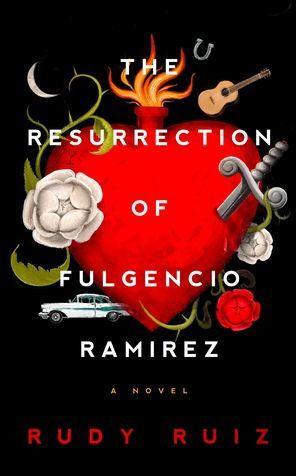
LITERARY FICTION
Rudy Ruiz
The Resurrection of Fulgencio Ramirez: A Novel
Blackstone Publishing
Hardcover (also available as an e-book, an audiobook, and on audio CD), 978-1-9826-0461-5, 300 pgs., $27.99
September 22, 2020
“The obituaries were always the first thing he turned to in the newspaper. He started doing it the day he learned she’d married another man.” What a hook, yes? It’s 1986 and pharmacist Fulgencio Ramirez is performing his morning ritual with the newspaper obituaries when he finally spies the name he’s been looking for.
In 1956, Fulgencio Ramirez is a first-generation norteamericano, the son of Mexican immigrants, from a long line of “ranchers, minstrels, gamblers, and poets.” A daring and ambitious high-school student, Fulgencio gets a job at the local pharmacy. There he falls head over heels at first sight with Carolina, the Anglo daughter of the pharmacist, as she and her friends sip milkshakes at the drugstore soda fountain, Elvis on the jukebox.
Fulgencio vows to become a pharmacist himself, the better to continue providing the Sueño Americano for his love. But this is the 1950s on the border and not everyone approves of this romance. Fulgencio has a rage problem, the product of a centuries-old family curse, and “he who gets mad loses.” Twenty-five years later, from his headquarters across the border—a ranch called “El Dos de Copas”—Fulgencio sets out to again woo the widow Carolina and put an end to the Ramirez family curse for good.
The Resurrection of Fulgencio Ramirez is the debut novel from San Antonio’s Rudy Ruiz. Ruiz’s first book, Seven for the Revolution, a collection of short stories, won four International Latino Book Awards, and he was the recipient of the Gulf Coast Prize in Fiction in 2017. Ruiz’s first novel is full of life, a brew of contemporary and historical fiction, a coming-of-age tale, adventurous, mysterious, and romantic, laced with social commentary, both spiced and sweetened by the grand Latinx tradition of magical realism.
The supernatural is natural, suffusing the lives of a large, dynamic cast. The Virgen de Guadalupe appears as a bas relief in a ranch-house wall; when she’s joyful, she dances Irish jigs. A rosebush under Carolina’s bedroom window blooms according to the vicissitudes of love; sometimes it shrivels to twigs, other times it grows to cover the wall. Fulgencio has as many friends and family who are ghosts as he does those who are still among the quick. Fulgencio’s grandfather’s ghost sits at the kitchen table, drinking whiskey and doing card tricks for la Virgen.
These characters are also very funny, especially when the usual suspects are loitering at Fulgencio’s pharmacy.
“Walmart’s gonna kill you. They’re practically giving the drugs away over there.”
“What kind of friend are you, Eleodoro? That you buy from the enemy?” Fulgencio pondered.
“They have frozen French fries by the ton too!” Eleodoro cried. “How can you compete with that? At least I bring you cabritos. I don’t do that for the Walmart.”
“They’d throw you out if you walked in there with a dead goat,” chimed in El Primo Loco Gustavo.
“He is a dead goat,” said El Gordo Jimenez.
El Primo Loco has a doctorate from MIT.
In Fulgencio Ramirez, we inhabit many forms of el Otro Lado. Ruiz sets his story in the fictional town of La Frontera, at the very tip of Texas. Across the river is El Dos de Copas, of which Brother William (also dead) waxes eloquent:
“This place is too pure for the church. No, let the church own the giant basilicas and ornate cathedrals. Let the church own altars encrusted with gold and chambers draped in velvet. This place is for God and His creatures . . . for you and for me. This patch of salt will be here still after we’ve all expired, and after the church bells have tumbled to the ground . . .”
Congratulations are due the design team at Blackstone; this book is beautiful in dramatic black and crimson, from the sacred heart on the jacket to the endpapers sporting roses, guitars, and a 1950s-era car with fins out to here.
The Resurrection of Fulgencio Ramirez is a story as romantic as the traditional boleros he sings to Carolina; the plot twists are worthy of classic telenovelas. Ruiz’s voice is distinctive, though the cadence is familiar, recognizable to readers of Gabriel García Márquez, Jorge Luis Borges, and Laura Esquivel, to name a very few. Ruiz’s style is also somehow comforting, recalling literature past. Fulgencio has the medicine we need right now.
Rudy Ruiz is a writer of literary fiction, essays, and political commentary. His earliest works were published at Harvard, where he studied literature and creative writing, and was awarded a Ford Foundation grant to support his writing endeavors. Seven for the Revolution was Ruiz’s fiction debut. The collection of short stories won four International Latino Book Awards.
Ruiz’s short fiction has appeared in literary journals including BorderSenses, The Ninth Letter, New Texas, and the Notre Dame Review. In 2017, Rudy Ruiz was awarded the Gulf Coast Prize in Fiction. In 2020, Blackstone Publishing will release Ruiz’s novel, The Resurrection of Fulgencio Ramirez.
